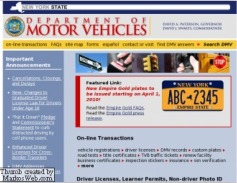 1. Make a new Will
1. Make a new Will
Although your Separation or Divorce Settlement Agreement should make it clear that you waive any claim you may have had in the estate of your (former) spouse, it is a good idea to prepare a new will to clearly direct how you want to distribute your assets in the event of your death. This is especially true if you had a prior will since it is likely that it had a provision leaving everything to your (now separated or divorced) spouse.
If you have children it is also important to prepare a new will in order to provide for their care. This would include setting up a Trust for any funds they may receive through your estate and naming a Trustee to manage this trust. You may also want to set a date beyond their 18th birthday for the distribution to them of their share of the funds to be sure they have sufficient money to cover the expenses of an education.
 2. Prepare a Deed to Transfer Real Estate
2. Prepare a Deed to Transfer Real Estate
Simply because your agreement says that one of you is to become the owner of real estate does not transfer title. Until you have a new deed prepared, you will be required to obtain your (former) spouse’s signature before you can sell or mortgage the property. Title is usually transferred with a Bargain and Sale Deed. There is no warranty of title being given; it is simply a signing off of any interest one of you may have in the property.
By the way, transferring title does not transfer the mortgage. Although it is likely that your agreement dealt with this issue, the only way one of you can have your name removed from the mortgage is if the spouse who is paying the mortgage refinances or sells the property. Until that time the bank considers both of you responsible for the mortgage payment, even though your agreement may state otherwise.
 3. Change the beneficiaries on any pensions
3. Change the beneficiaries on any pensions
It is likely that you have listed your (former) spouse as a beneficiary on these accounts. If your agreement requires you to keep your now former spouse as beneficiary for some defined period of time, once the divorce is signed you should change the beneficiary designation to “my former spouse, their name” since New York law removes that person as beneficiary even if you intended on keeping the designation as it was. If you should die without changing your beneficiary, the death benefit will be paid into your estate and not to the required person. If you are still married but legally separated, you may need your spouse to sign a document authorizing the change in beneficiary.

4. Reregister your cars and notify your auto insurance carrier
Your agreement may require you to change the title to your motor vehicles, boats, snowmobiles, etc. Although you may want to wait until the next renewal date, you should know that the owner is likely to be named in a lawsuit if the driver is involved in an automobile accident.
5. Change your bank accounts and close any joint credit lines
Remember to go to the bank where any accounts are located and take whatever steps are required to remove your spouse’s name from any joint accounts that now belong to you. This is especially true if the account has a line of credit or home equity loan associated with it. Don’t forget to notify the bank of your new address if it has changed.

6. Notify the insurance company of any obligation to maintain insurance
Often the agreement with your spouse requires one of you to maintain life or health insurance. If you are to receive these benefits you should notify the insurance company or employer, in writing, of this obligation and request that they notify you if a premium is not paid or if the policy is about to be cancelled. You may also have to provide them with a copy of your Judgment of Divorce and that part of your agreement that contains this requirement.
 7. Cancel any joint credit cards
7. Cancel any joint credit cards
You should cancel any joint credit cards and open new ones in your own name. In addition, since you may be liable for new charges made by someone (such as your former spouse) who was previously authorized to use a credit card in your name, it is also a good idea to cancel any credit cards that were previously used by your (former) spouse if he or she is no longer authorized to use the card.
Share with Friends:
Need More Information?
To schedule a free phone or video consultation, complete and submit the form below, email us at [email protected], or call 518-529-5200.





